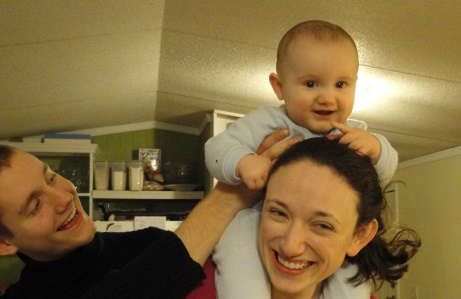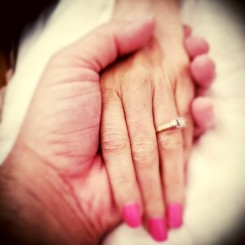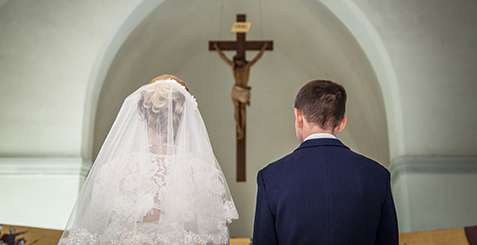The Catechism of the Catholic Church describes grace as the “free and undeserved help that God gives us to respond to his call to become children of God.” My husband, Frank, and I have experienced God’s “undeserved help,” as we have wrestled with His plan for our family. We now know it was God’s grace that guided our journey.
Frank and I met in our work place soon after college. Our first date was at a Chinese restaurant. After dinner, my fortune cookie read, “Stop searching forever, happiness is just next to you.” Frank thought it was the coolest thing ever—I wondered if it was a setup! From that unexpected beginning, we married and had five children almost immediately. Because of our family size, people often assumed that we were “good Catholics,” thinking that we had always accepted the Church’s teaching prohibiting contraception. In our case that assumption would be wrong. We had used contraception despite the fact that the priest who prepared us for marriage taught us Church teachings. We stopped using contraception only to have our first baby,Emily. We did the same for our second child, Madeline, and our third child, Sam.
Around the time that Sam was born, Frank and I became involved in youth ministry. This prompted me to question our own contraceptive behavior. If we had to explain the Church’s teachings on chastity, I thought, we should follow them ourselves! I quickly ordered Natural Family Planning (NFP) books and signed up for the local diocesan class. Before class began however, I skimmed through the book and started tracking my menstrual cycle on a calendar. One romantic evening soon after that, with total disregard for the calendar , we conceived our twins, Caroline and Sophia.
Having five babies within six years was extremely overwhelming. Without hesitation I forgot about NFP and got a prescription for birth control pills. Something quite unexpected then happened. During these years using contraception I lost my sexual desire for my husband. Sex became one more thing I had to do for somebody. In addition, Frank and I began to fight about sex. Needless to say, this was upsetting—I loved my husband and I often prayed that God would help us!
In this difficult period a new parish priest came into our lives. With every examination of conscience in preparation for the Sacrament of Reconciliation he would bring up contraception. I would immediately dismiss the subject. “That teaching doesn’t apply to us,” I thought, “we have five kids!” And yet, this new priest ’s comments stuck with me and my heart remained restless. The turning point for me happened after a conversation about sterilization.
One of our friends had been sterilized and asked me when Frank would “get snipped.” Without missing a beat, I said, “Maybe for my birthday.” The fact that I so easily thought of sterilization got me thinking— how could I, we , decide to do something so major without talking about it and praying? Soon after this realization, I wondered why we were not open to having another child. I found myself offering simple prayers asking God to help us. It was the first time that I had asked God for guidance regarding our fertility. From that simple step , God began to send signs though neighbors, family and friends.
Soon after that, I spoke with our new parish priest about my concerns. He confirmed that the Church’s teachings were true and gave me CDs and books to learn more. At the same time, I kept receiving signs about having a sixth child. For example, when we were out to dinner I complimented a woman about the behavior of her five children. She thanked me and mentioned that her sixth child was away at college. At a parish meeting I saw an old friend who commented that she thought I had a new baby. She had not known we were discerning. I shared these and other experiences with our new parish priest and asked if they were signs from God. He said if they were, they would not stop coming. Father’s words could not have been more true—the signs kept coming.
Meanwhile, Frank and I signed up for NFP class. It may sound like an exaggeration, but from the first day we began using NFP everything immediately felt different. Frank would set the alarm, take my temperature, and re cord the numbers on the chart. I felt so taken care of. I felt a tenderness that I hadn’t felt in a long time. I liked that he was learning about my body. It was helpful that he knew where I was in my cycle, especially during difficult days. I came to understand this total love and acceptance in a deeper way.
As we lived the NFP lifestyle, we began to realize that all of our reasons for avoiding pregnancy were “earthly”— we would need a new car, a bigger house, and more money for everything. An unexpected encounter with an old man in a donut shop broke through our hesitation. “So, how many kids do you have?” I asked. “Three boys and three girls,” he responded. I got the biggest smile on my face, called my husband to share the story, and that evening our precious son,Thomas Anthony, was conceived.
It is by the grace of God that we have our children and a redeemed sex life as well. My husband, Frank, and I have learned that our sexual union should be focused on giving rather than getting. NFP provided the environment to live this out. We are so grateful that we now have the kind of marital union that God had planned for us! I t has changed our lives so much that we became NFP teachers to spread the good news.
Now that we use NFP, we see our married life as always having an opportunity to love like God loves. Of course, God provides the grace, and we must choose to participate with Him. I am convinced that there is something about getting the sexual element of marriage “right with God” that ends up affecting everything. Marital union is the marriage vows made flesh and every act of intercourse is a renewal of these vows. Only a union centered on God and His will in our lives will truly satisfy the desires of our hearts!
About the author
Jennifer, her husband Frank, and their six children are from the Diocese of Cleveland.



 In the fall of 2011, my husband Patrick and I had been married eight years and our family was rapidly growing. Our oldest child had just turned six and we were expecting our fifth child in December. John Paul was born on December 6, 2011. We knew immediately that something was very wrong. The delivery itself was traumatic, during which his arm was broken. When he was finally delivered, he didn’t make a sound. He couldn’t breathe. He was barely moving. He was whisked away to the neonatal intensive care unit. In the days and weeks that followed, we gradually started to understand the severity of John Paul’s condition. When he was 5 weeks old, he was diagnosed with Spinal Muscular Atrophy (SMA). We learned that SMA was a genetic, progressive and terminal neuromuscular disorder. Gradually, every muscle in John Paul’s body would weaken and eventually waste away. Usually death is caused by complications from a common cold because of respiratory weakness. You can imagine how we felt being told that our son would die from complications of a common cold, knowing that we had four children at home, several of whom were not yet adept at covering their mouth and nose when they sneezed or coughed.
In the fall of 2011, my husband Patrick and I had been married eight years and our family was rapidly growing. Our oldest child had just turned six and we were expecting our fifth child in December. John Paul was born on December 6, 2011. We knew immediately that something was very wrong. The delivery itself was traumatic, during which his arm was broken. When he was finally delivered, he didn’t make a sound. He couldn’t breathe. He was barely moving. He was whisked away to the neonatal intensive care unit. In the days and weeks that followed, we gradually started to understand the severity of John Paul’s condition. When he was 5 weeks old, he was diagnosed with Spinal Muscular Atrophy (SMA). We learned that SMA was a genetic, progressive and terminal neuromuscular disorder. Gradually, every muscle in John Paul’s body would weaken and eventually waste away. Usually death is caused by complications from a common cold because of respiratory weakness. You can imagine how we felt being told that our son would die from complications of a common cold, knowing that we had four children at home, several of whom were not yet adept at covering their mouth and nose when they sneezed or coughed.



